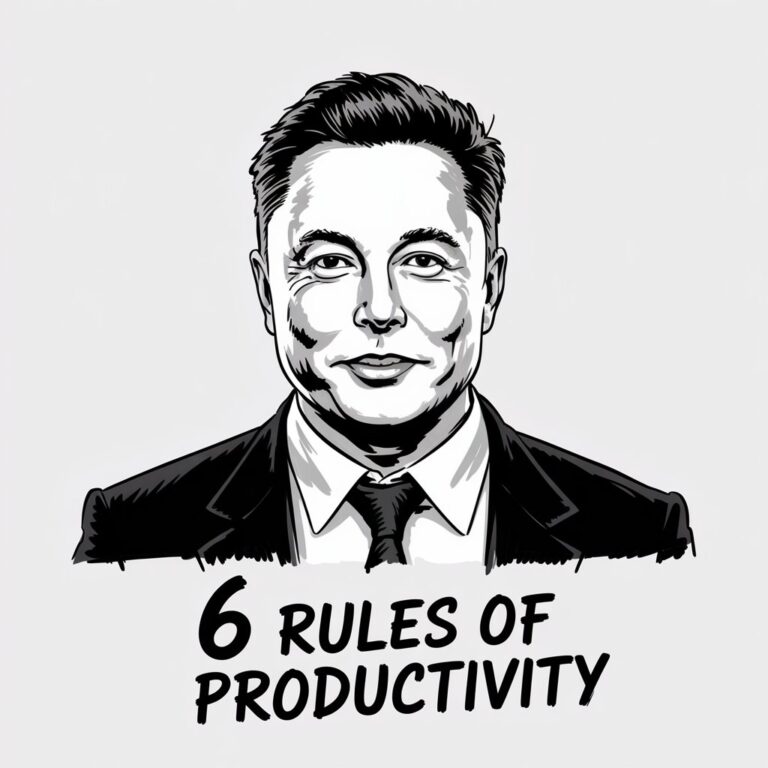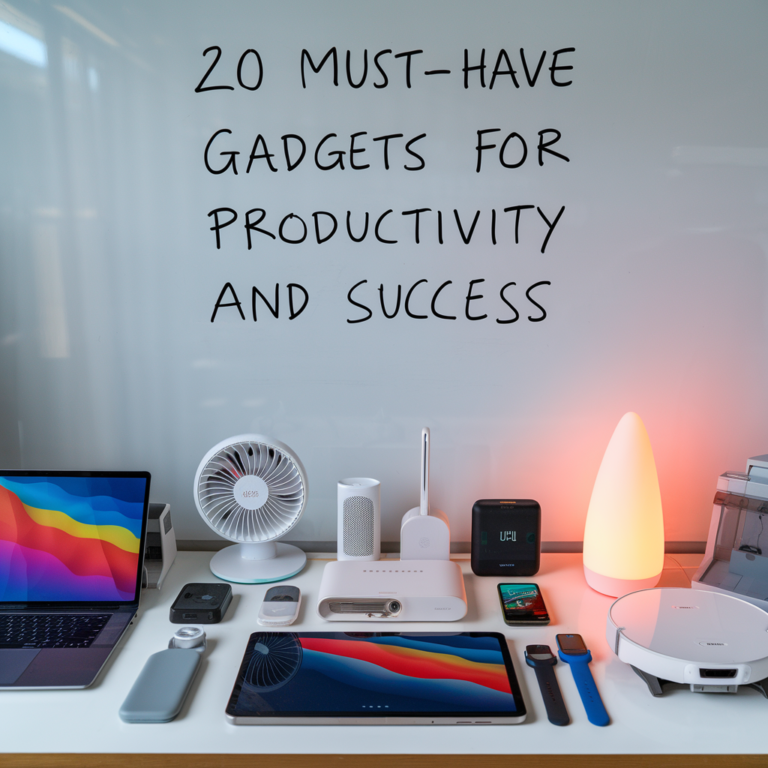In today’s fast-paced world, people often feel the pressure to do more in less time. As a result, multitasking has become a popular approach to getting through the endless to-do lists we face every day. However, there’s growing evidence that mindfulness—the practice of being fully present in the moment—offers a more effective way of managing tasks and maintaining mental well-being. But which is better mindfulness or multitasking? Let’s dive deeper into these two approaches to understand their benefits, drawbacks, and which one is best suited for a balanced, productive life.
In this detailed exploration, we’ll look at how both mindfulness and multitasking affect productivity, mental health, and overall effectiveness. By the end, you’ll have a clearer understanding of which approach might work best for you.
What is Multitasking?

Multitasking refers to the ability to handle more than one task simultaneously. It’s a strategy that many people use to juggle competing priorities, such as answering emails during meetings, cooking dinner while on a conference call, or scrolling through social media while working. On the surface, multitasking seems like an efficient way to manage time and maximize productivity.
In reality, multitasking isn’t as effective as it seems. While people may believe they’re doing multiple things at once, what they’re actually doing is task-switching—shifting their focus rapidly from one task to another. This constant switching comes at a cost, reducing overall efficiency and increasing cognitive load.
The Appeal of Multitasking
For many people, the appeal of multitasking lies in the illusion of productivity. It feels good to tick multiple items off the to-do list in a short amount of time. People who pride themselves on being multitaskers often feel like they’re getting more done, which can lead to a sense of accomplishment. In high-pressure environments, multitasking seems like a necessary skill to meet the demands of work, home, and personal responsibilities.
The Drawbacks of Multitasking
While multitasking can give the impression of increased productivity, studies suggest that it often leads to lower-quality work, higher levels of stress, and decreased cognitive function. Research shows that the brain can only focus on one task at a time, and when it tries to handle multiple tasks, its performance suffers.
Here are some key drawbacks of multitasking:
- Reduced Focus: Constantly switching between tasks diminishes focus. The brain struggles to maintain attention, which leads to mistakes and slower completion times.
- Decreased Efficiency: Multitasking often results in tasks taking longer to complete. Studies have shown that it takes an average of 23 minutes to refocus on a task after being interrupted.
- Increased Stress: Trying to juggle multiple tasks can lead to feelings of overwhelm and stress. The brain becomes fatigued by switching gears, which impacts mental clarity and well-being.
- Impaired Memory: Multitasking can impair short-term memory, as the brain has difficulty retaining information when it’s constantly shifting focus.
Given these drawbacks, it’s worth asking: which is better—mindfulness or multitasking? Let’s explore mindfulness as an alternative approach to managing tasks and improving productivity.
What is Mindfulness?
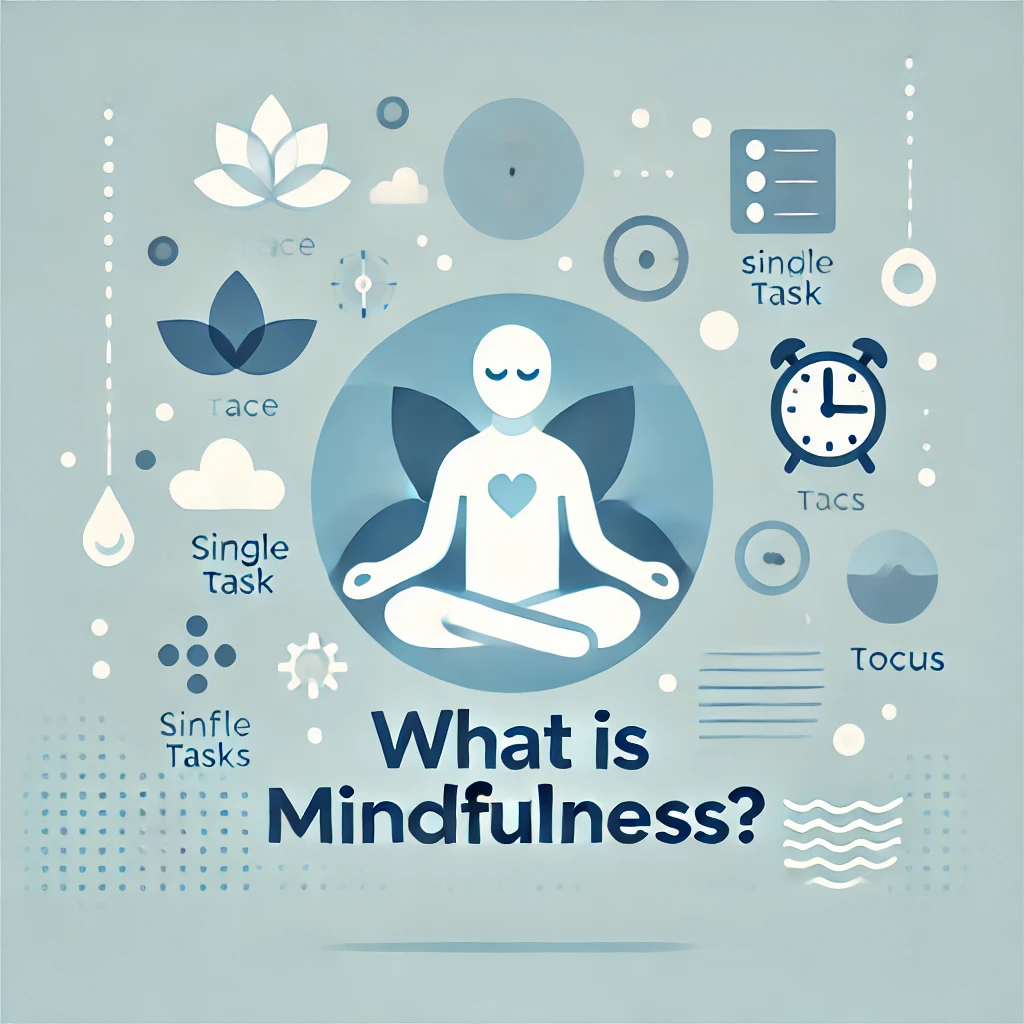
Mindfulness is the practice of focusing on the present moment without judgment. It involves paying attention to your thoughts, feelings, and physical sensations with full awareness, allowing you to engage deeply with whatever you’re doing at the time. Whether it’s working on a project, eating a meal, or having a conversation, mindfulness encourages you to be fully present rather than distracted by other thoughts or activities.
Unlike multitasking, mindfulness is about doing one thing at a time and giving it your full attention. This approach helps reduce mental clutter and allows you to engage more deeply with your tasks, leading to better outcomes and a calmer state of mind.
The Benefits of Mindfulness
Mindfulness has gained widespread attention for its numerous benefits, both for mental health and productivity. Here are some key advantages of practicing mindfulness:
- Improved Focus: Mindfulness helps train the brain to concentrate on a single task without being easily distracted. This can lead to better performance and higher-quality work.
- Reduced Stress: By staying present in the moment, mindfulness can help reduce stress and anxiety. It encourages relaxation and helps you manage challenging situations with greater ease.
- Enhanced Cognitive Function: Mindfulness has been shown to improve memory, attention, and problem-solving abilities. It helps you think more clearly and make better decisions.
- Greater Emotional Regulation: Practicing mindfulness can improve emotional intelligence by helping you become more aware of your emotions and respond to them thoughtfully rather than reactively.
- Better Mental Well-Being: Regular mindfulness practice has been linked to improved mental health, including lower rates of depression and anxiety. It promotes a sense of peace and well-being by helping you stay grounded in the present.
With these benefits in mind, it becomes clear that mindfulness offers a powerful alternative to multitasking. But when it comes to productivity, which is better mindfulness or multitasking?
Multitasking vs. Mindfulness: Which is More Productive?
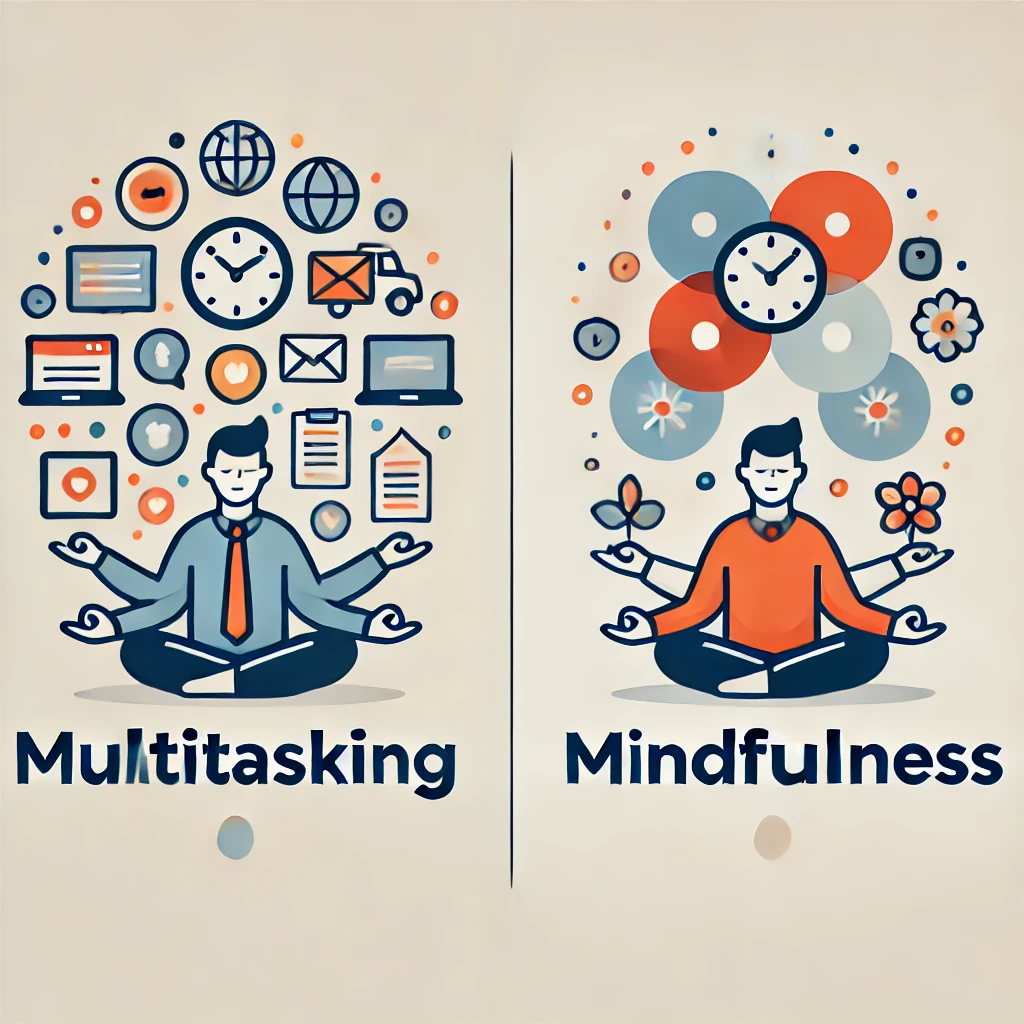
When considering which is better mindfulness or multitasking—for productivity, it’s important to look at how both approaches impact task performance, efficiency, and overall work quality.
How Multitasking Affects Productivity
Multitasking may seem like an efficient way to manage time, but research has consistently shown that it reduces productivity. The brain isn’t designed to handle multiple tasks at once, and the act of task-switching slows down cognitive processing. This leads to mistakes, missed details, and a longer time to complete tasks.
For example, a study by the American Psychological Association found that people who try to multitask experience a 40% drop in productivity. The constant switching between tasks disrupts focus, making it difficult to complete any task efficiently.
In high-stakes environments, such as the workplace, multitasking can also lead to burnout. The mental effort required to constantly shift between tasks drains energy and increases stress levels. As a result, multitasking often leads to a decrease in the quality of work, which can have long-term negative consequences.
How Mindfulness Affects Productivity
On the other hand, mindfulness enhances productivity by helping you focus fully on the task at hand. By eliminating distractions and staying present in the moment, mindfulness allows you to work more efficiently and with greater clarity. When your attention isn’t divided, you’re more likely to produce high-quality work and complete tasks faster.
In fact, research shows that mindfulness can improve cognitive flexibility, allowing you to adapt more quickly to changes in tasks or priorities without losing focus. This makes it easier to manage complex projects or workloads without feeling overwhelmed.
Moreover, mindfulness helps reduce mental fatigue, allowing you to maintain focus for longer periods. By practicing mindfulness, you can approach tasks with greater attention to detail, leading to fewer errors and a more efficient workflow.
So, when it comes to productivity, which is better mindfulness or multitasking? The answer is clear: mindfulness offers a more sustainable, effective approach to managing tasks and maintaining mental clarity.
The Impact of Multitasking and Mindfulness on Mental Health
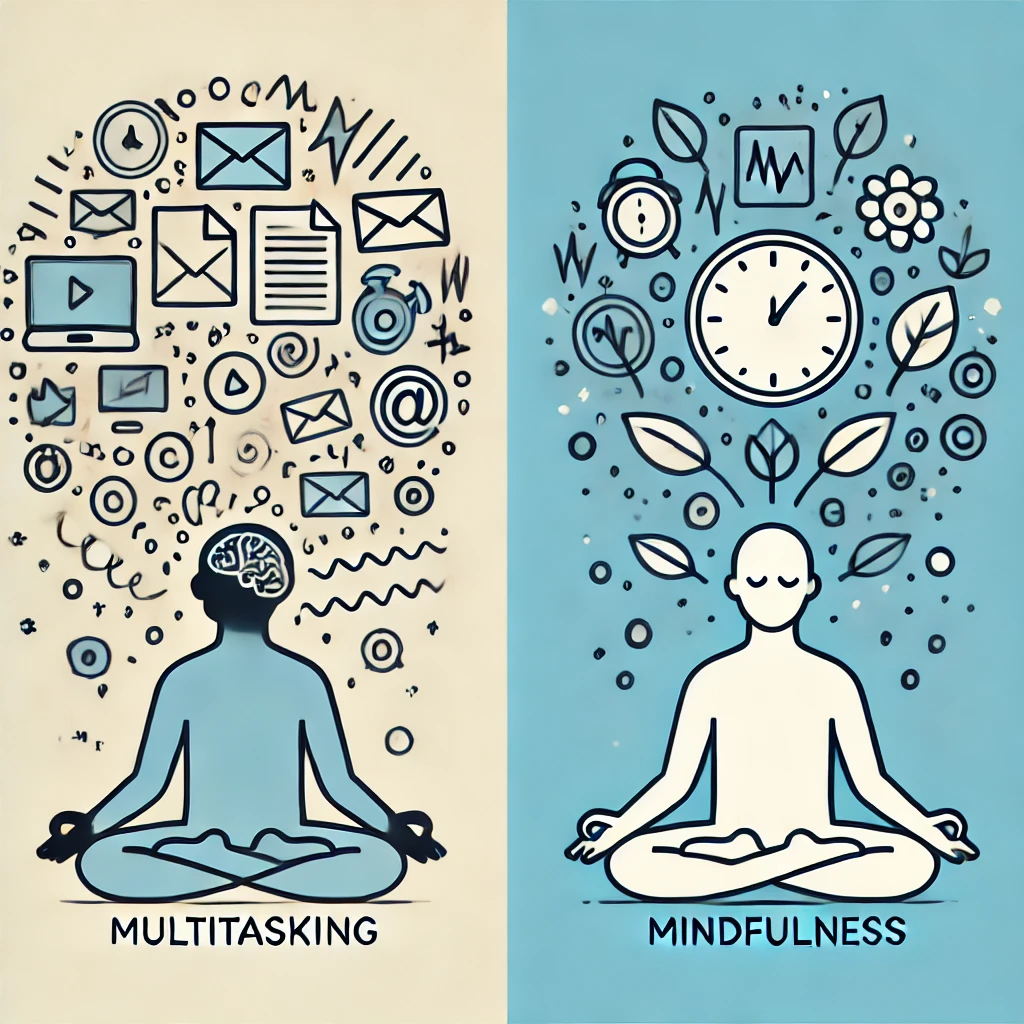
Beyond productivity, it’s important to consider the effects of multitasking and mindfulness on mental health. In today’s demanding world, many people experience high levels of stress and anxiety as they try to juggle multiple responsibilities. How do multitasking and mindfulness compare in terms of promoting mental well-being?
The Mental Health Impact of Multitasking
Multitasking can take a significant toll on mental health. Constantly switching between tasks increases cognitive load, leading to mental exhaustion and higher levels of stress. Over time, this can contribute to burnout, anxiety, and even depression.
Additionally, multitasking often creates a sense of overwhelm. When you’re trying to manage several things at once, it’s easy to feel like you’re not doing any of them well. This can lead to frustration, self-doubt, and decreased job satisfaction.
Multitasking can also interfere with personal relationships. Being distracted by your phone or other tasks during conversations can strain relationships and prevent meaningful connections.
The Mental Health Benefits of Mindfulness
Mindfulness, by contrast, is well-known for its positive impact on mental health. By staying present in the moment, mindfulness helps reduce stress and promote relaxation. It encourages a sense of calm and allows you to approach challenges with a clearer, more balanced mindset.
One of the key benefits of mindfulness is its ability to improve emotional regulation. When you practice mindfulness, you become more aware of your emotions and better equipped to respond to them in a healthy way. This can help reduce feelings of anxiety and prevent emotional overwhelm.
Moreover, mindfulness fosters self-compassion. By being present with your thoughts and feelings without judgment, you can develop a kinder, more accepting attitude toward yourself. This has been shown to improve mental well-being and reduce symptoms of depression.
Given the profound mental health benefits of mindfulness, it’s evident that when it comes to emotional well-being, which is better mindfulness or multitasking—mindfulness is the clear winner.
Mindfulness in the Workplace: A Growing Trend
As more companies recognize the negative effects of multitasking, many are turning to mindfulness as a way to improve employee well-being and productivity. Mindfulness practices, such as meditation, breathing exercises, and mindful breaks, are increasingly being integrated into workplace wellness programs.
Organizations that promote mindfulness in the workplace often report improved employee satisfaction, reduced stress levels, and enhanced team collaboration. By encouraging employees to focus on one task at a time and practice mindful communication, companies are fostering a more positive and productive work environment.
How to Implement Mindfulness in the Workplace
If you’re interested in incorporating mindfulness into your work routine, here are a few practical tips:
- Start with Mindful Breathing: Take a few minutes at the start of your day to practice mindful breathing. Focus on your breath and let go of distractions to center your mind.
- Prioritize Single-Tasking: Commit to working on one task at a time, giving it your full attention. Turn off notifications, set specific time blocks for tasks, and avoid switching between activities.
- Take Mindful Breaks: Throughout the day, take short breaks to check in with yourself. Practice deep breathing, stretch, or go for a short walk to refresh your mind.
- Practice Mindful Listening: During meetings or conversations, practice being fully present by focusing on the speaker and avoiding distractions like your phone or emails.
Which is Better: Mindfulness or Multitasking?
After examining the impact of both mindfulness and multitasking on productivity, mental health, and overall effectiveness, the answer to which is better mindfulness or multitasking—becomes clear. While multitasking may give the illusion of productivity, it often leads to lower-quality work, increased stress, and decreased mental well-being.
Mindfulness, on the other hand, offers a more sustainable approach to managing tasks and responsibilities. By focusing on one thing at a time and staying present in the moment, mindfulness improves productivity, enhances mental clarity, and promotes emotional well-being.
For those looking to enhance their performance and live a more balanced life, mindfulness is the better choice. It encourages a healthier, more focused way of working and living, helping you achieve better results without sacrificing your mental health.
Conclusion
In a world that often celebrates the hustle and bustle of multitasking, it’s easy to get caught up in trying to do everything at once. But when you ask yourself, which is better mindfulness or multitasking, the evidence clearly favors mindfulness.
By choosing mindfulness over multitasking, you can improve your focus, reduce stress, and cultivate a sense of calm and purpose in your daily life. Whether you’re at work or home, practicing mindfulness will help you achieve more with less mental strain, allowing you to live a more fulfilling and productive life.
FAQs
1. Is multitasking against mindfulness?
Yes, multitasking is fundamentally opposed to mindfulness. Mindfulness is about being fully present and engaged in one task or moment at a time, while multitasking involves splitting attention across multiple tasks. When you multitask, you’re often distracted, which goes against the core principle of mindfulness, which is to focus your awareness on the present without distraction or judgment.
2. What is better than multitasking?
Mindfulness, or single-tasking, is considered better than multitasking. By focusing on one task at a time, you can improve the quality of your work, reduce mistakes, and complete tasks more efficiently. Mindfulness also has numerous benefits for mental health, including reducing stress and improving emotional regulation. This makes it a far more sustainable and effective approach to managing tasks compared to multitasking.
3. Is multitasking good for your brain?
No, multitasking is generally not good for your brain. Studies have shown that multitasking can reduce cognitive efficiency and increase mental fatigue. When you multitask, your brain struggles to switch between tasks, leading to a decrease in focus, slower task completion, and a higher likelihood of making mistakes. Over time, this can increase stress levels and impact your overall mental health.
4. Are female brains better at multitasking?
There is a common belief that women are better at multitasking, but scientific studies provide mixed results. While some research suggests that women may show slightly better performance in multitasking scenarios, other studies indicate that both men and women experience similar cognitive challenges when trying to handle multiple tasks simultaneously. Overall, multitasking is difficult for all brains because human cognitive capacity is limited, regardless of gender.
5. Is multitasking successful?
In most cases, multitasking is not successful. While it may give the appearance of productivity, it often leads to lower-quality work, more errors, and longer task completion times. Studies have consistently shown that multitasking impairs performance and increases cognitive load, making it less effective than focusing on one task at a time. Mindfulness, or single-tasking, is generally a more successful approach for both productivity and mental well-being.


